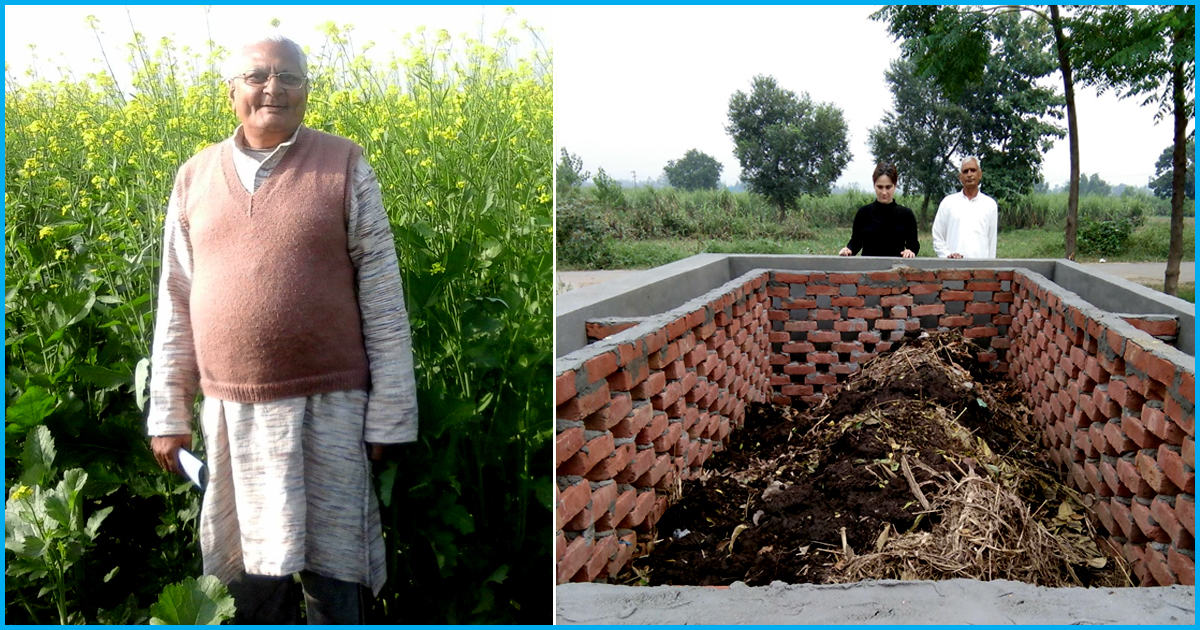Last year, many parts of northern India surpassed their records of bad air quality index. A major cause of this was attributed to stubble burning in the states of Punjab and Haryana. Several solutions like usage of expensive machines like rotavator or even fining farmers guilty of burning the stubble were suggested. However, neither of these solutions proved to be viable for wide implementation.
However, an once for all solution seems to be just on the horizon. The Lalit-Raman Model, designed by two friends – Lalit Tyagi and Raman Kant has been successfully implemented in at least 50 villages of Uttar Pradesh.
Mr Raman Kant Mr Lalit Tyagi The Lalit-Raman compost pit
Mr Tyagi and Mr Kant started the Neer Foundation in 2004. Passionate about the environment, these two men began their journey towards involving all the stakeholders and work towards a sustainable environment.
The year was 2015, around the same time when the conversation about stubble burning being one of the major contributors to the highly hazardous climatic situation up north started. It was then that Mr Tyagi and Mr Kant started working towards an easy and inexpensive way to combat the same. Almost a year of brainstorming and research, led to the invention which was named as the Lalit-Raman compost pit. In western Uttar Pradesh, nearly 22 districts mainly grow sugarcane and rice, which results in a lot of agricultural wastage comprising of sugarcane leaves and paddy waste. It leaves no choice to the farmer than to burn it to clear the fields for new crops. This burning practice harms the soil and rips it off its natural organic and also releases harmful greenhouse gases such as carbon dioxide in the air.
The duo shortlisted the problems they wanted to fight, which boiled down to two major issues-to check, control the soil quality and that of crop residue burning in open field. They started from one village in Meerut district in Uttar Pradesh, a state where Sugarcane and paddy are grown in abundance, resulting in sugarcane leaves and paddy waste. The compost pit has an outer dimension of 8*3*1 m and inner dimension of 7.1*2.1*1 m. The pit is filled with ingredients like sugarcane leaves, paddy waste, cow dung, soil and water, each of which is easily available. In a period of two months, it gives solid manure, enough to be used for the whole field. Mr Kant told The Logical Indian, “We also have an additional part in the pit which collects liquid manure. We tell the farmers to construct these pits near the water source so that the liquid manure is combined with irrigation water. This is more effective than spraying insecticide or pesticide.”
Mr Kant and Mr Tyagi realised during their survey that there were three main reasons why farmers shied away from composting – less number of animals, lack of labour and lack of understanding about the quality compost technique. “One of the main challenges was to make farmers try the L-R compost pit. They were quite hesitant, in fact, for the first farmer who tried our compost pit, we paid for part of its construction. However, when more and more farmers started trying it out. At present, 250 farmers from 50 villages in Meerut district are reaping the benefits of this pit.”
Inexpensive and sustainable
The duo says that the cost of the pit is up to Rs 25,000. These pits are a long time investment since they have a life of up to 20-25 years. “Due to large size of the pit, it can be easily filled and after the solid manure is ready, it can be easily taken out of the pit for usage. The liquid manure can be given along with irrigation water in every 20 days time and can also be sprayed on the crops,” they say. They also claim that by using this pit, one can put an end to about 45,000 kg of CO2 in the environment.
The LR composting pit has also been approved by the Ministry of Agriculture and Farmers welfare, Government of India(GOI), Indo Global Social Service Society (Germany), Ministry of Environment, Forest and Climate Change, GoI and United Nations Development Program, New Delhi. The duo now aims to introduce this compost pit to other states as well.
The Logical Indian appreciates Mr Kant and Mr Tyagi for coming up with such a brilliant initiative which will prove to be extremely useful for the environment.
Also Read: Pune Woman Converts 3,500sqft Plot Into A Garden Which Feeds 10-12 People Daily











